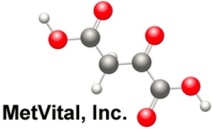
© CEOCFO Magazine -
CEOCFO Magazine,
Phone: 727-
Email: info@ceocfocontact.com


Search





Lynn Fosse, Senior Editor
Steve Alexander, Associate Editor
Bud Wayne, Editorial Executive
Christy Rivers -
Valerie Austin -



 Print -
Print -
A Human Energy Metabolite is Hopeful for Age-
 Alan Cash
Alan Cash
President & CEO
MetVital, Inc.
Contact:
Alan Cash
858-
Interview conducted by:
Lynn Fosse, Senior Editor
CEOCFO Magazine
Published – March 30, 2020
CEOCFO: Mr. Cash, what is the idea behind MetVital, Inc?
Mr. Cash: We found that a human metabolite, oxaloacetate, which is involved in energy production in our bodies, essentially in nearly every cell of our body, can be used to modify metabolism and potentially help ameliorate disease. The specific diseases we are looking at right now include various cancers such as glioblastoma, (brain cancer), liver cancer, and even conditions like fatigue in breast cancer patients. Outside of cancer we are involved in a Phase I trial right now for Amyotrophic Lateral Sclerosis or ALS, also known as Lou Gehrig’s disease, to see if we can help with that disease, and we just completed a Phase 2A trial in Alzheimer’s disease.
CEOCFO: How did you come upon the idea?
Mr. Cash: We initially did not set out to treat disease, but were trying to understand aging as a process. To reduce aging, we modified metabolism to be more similar to the calorie restricted metabolic state. We know that in calorie restriction there are many benefits that we see in animal models. The largest benefit is an increase in lifespan of up to twenty five percent, which until recently, we are unable to achieve through any means other than calorie restriction. In addition, there are many other benefits that we see in the calorie restricted metabolic state other than just increases in lifespan; a decrease in the incidence of cancer, in some cases the ability to treat cancer, decreases in auto immune type diseases, decreases in the effects on Alzheimer’s disease in model mice-
As we were doing the research on trying to mimic the calorie restriction metabolic state, we saw that we were able to modify a particular ratio in the cells; that of the NAD+/ NADH ratio, using this metabolite oxaloacetate in order to see some of the very same effects. It was exciting that we were able to see a 25% increase in lifespan in our first experiments, using c elegans, which are very small worms. Later, we successfully increased the lifespan of flies, then mice.
CEOCFO: How did you decide what to look at first; what diseases?
Mr. Cash: My background is in physics and as a physicist, we take large amounts of data and try to find something simple in it, like F=MA or E= MC2. I looked at the data on aging and what I initially saw was that nothing worked. From the age of the pyramids we have been trying to address aging and at that point, the only thing that we have found that had an effect on systemic aging was calorie restriction. The life extending power of calorie restriction was initially found in the 1930s at Cornell University, in animal tests. The scientists had essentially established the baseline of what animals would eat and then after they fed them twenty five percent less, surprisingly they lived twenty five percent longer than the animals that ate a normal diet. It was an interesting finding, considering that the thought at the time was that if they had less energy or food they would live shorter lives. However, instead they lived longer lives.
Since the 1930s, scientists have done tests all the way from single celled animals like yeast, upwards through the animal kingdom to primates-
While we were doing this research into calorie restriction and compounds that mimicked this metabolic state, other major universities started identifying oxaloacetate as a potential therapeutic candidate for a variety of diseases, including cancer, ALS and Alzheimer’s disease. Unfortunately, oxaloacetate initially was not a good therapeutic candidate because it spontaneously decomposed in a short time. The product was not stable under room temperature conditions. We were able to overcome this problem as our research identified and patented an oxaloacetate compound that was stable for up to 2 years at room temperature, finally allowing the development of oxaloacetate as a drug.
CEOCFO: What have you learned up through today?
Mr. Cash: We have learned that metabolism can be an important feature in many long-
CEOCFO: What is your funding situation?
Mr. Cash: I have been a successful entrepreneur and my previous company was an Inc. 500 company. I received a lot of recognition, including a finalist at the Deloitte & Touche Technology Fast 50, Ernst & Young Entrepreneur of the Year, and other awards. I was invited to the White House. My success at previous companies allowed me to personally fund MetVital through the preclinical stage and early clinical stages. We are now out looking for funding to develop our clinical trial work further. Our first capital raise will be used to fund a Phase II-
CEOCFO: What has been the response from people in the medical community who are aware of what you are doing now?
Mr. Cash: They are excited! One of the things that we have seen in our animal models is that oxaloacetate can increase the density of mitochondria in the cell through a process called mitogenesis. Researchers are looking at cancer and Alzheimer’s disease from a metabolic standpoint to find non-
CEOCFO: What do you understand about moving along the development process? What might give you a leg up from what you have learned, given your past experience?
Mr. Cash: I think that one of the big reasons that most drugs fail in clinical trial is toxicity. Probably eighty to ninety percent of drugs just will not make it past Phase I-
CEOCFO: Have similar approaches been tried?
Mr. Cash: Yes. We started off, rather than as a drug company, as a nutritional supplement company. There have been a variety of nutritional supplements that have made it into the drug world and have been very successful. One Example is KOS pharmaceuticals, which used a B vitamin to lower cholesterol levels. They had a proprietary method of delivering this vitamin and they ended up selling that company for $1.7 billion after a short development time. In order for a nutritional supplement to be successful in the drug market, there has got to be a problem with the nutritional supplement that is solved by a patented solution.
In our case with oxaloacetate, if you put it in a jar and put it on the table-
CEOCFO: What does the next year look like for MetVital?
Mr. Cash: The next year is very exciting! We have initiated a Phase I trial in ALS that is on-
CEOCFO: What is the Warburg effect?
Mr. Cash: The Warburg effect is the over-
CEOCFO: There are so many new ideas in health. Why look at MetVital, Inc?
Mr. Cash: Both researchers and clinicians should pay attention to MetVital because we are modulating metabolism toward a healthier state on a cellular level. Instead of trying to destroy cancer, we are trying to metabolically alter it, to slow its growth. While this is not a cure, our initial pre-
MetVital, Inc., Glutamate Excitotoxicity Treatment, Glutamate Excitotoxicity and Neurodegeneration, Alan Cash, A Human Energy Metabolite is Hopeful for Age-
“In certain cancers that are very difficult to treat, such as brain cancer and primary liver cancer, an extension of life and good quality of life during treatment could be a major improvement over the current standard of care.”-